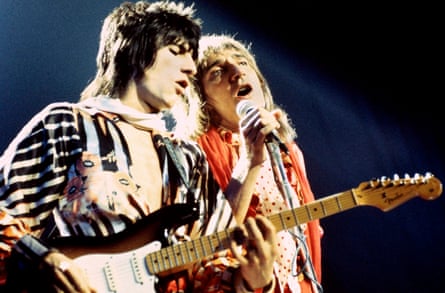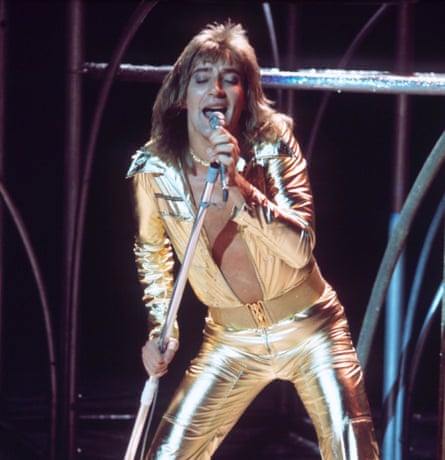20. Baby Jane (1983)
This is essentially a lyrical update of (I’m Not Your) Steppin’ Stone or Where Do You Go to (My Lovely)? – in summary: peeved ex complains that former girlfriend now moves in lofty circles. But Baby Jane was as good as 80s-pop Rod got: very of-its-era arrangement, great melody, big old chorus, a UK No 1.
19. Brighton Beach (2013)
“I hear you’ve written songs for your new album,” Elton John remarked to Stewart on stage in London. “What’s it called – Rarities?” And indeed, Time’s standout track was good enough to make you wonder why Stewart didn’t make the effort more often: a sweet, sad acoustic memoir of love lost in the singer’s beatnik youth.
18. Gasoline Alley (1970)
The title track of Stewart’s second album is his early solo approach in a nutshell. Folky and sensitive yet tough in sound and mood, it somehow manages to rock despite the languid pace and lack of drums. The interplay between Rod’s rasp and Ronnie Wood’s slide guitar is a marvel.
17. Downtown Train (1989)
A perfect example of Stewart’s skill as an interpreter of others’ songs: he digs deep and finds a melody in the verses not fully evident in Tom Waits’s original – it’s masked by Waits’s trademark vocal approach – and emerges with a song transformed into the stuff of arena singalongs.
16. I Don’t Want to Talk About It (1975)
The same year Neil Young belatedly released Tonight’s the Night – his racked response to the deaths of roadie Bruce Berry and guitarist Danny Whitten – Stewart covered Whitten’s signature ballad. One is harrowing, chaotic and dissipated, the other smooth, orchestrated pop-rock, but they’re equally moving: Stewart’s vocal is understated, capturing the song’s lovelorn misery.
15. Every Picture Tells a Story (1971)

Co-written by Stewart and Wood, the glorious title track of Stewart’s solo breakthrough – a transatlantic No 1 – has a lot of the Faces’ ramshackle charm. The lyrics detail romantic mishaps around the world, the 12-string guitar is out of tune, and the backing vocals come from former mentor Long John Baldry.
14. I Was Only Joking (1977)
Noticeably more thoughtful than the rest of his Foot Loose and Fancy Free album, the remorseful I Was Only Joking unexpectedly suggests a certain darkness – and weariness – behind Stewart’s playboy image: “Illusions of that grand first prize are slowly wearing thin.” Also home to a great bit of fourth-wall breaking: “Verse seven is never clear.”
13. (I Know) I’m Losing You (1971)
Throughout his career, Stewart has recorded dozens of Motown covers, but this might be his best: essentially a Faces track in all but name (it features all four members), it transforms the Temptations’ original version into loose-limbed rock, complete with unexpectedly thrilling drum solo, without sacrificing its intensity.
12. Forever Young (1988)
Stewart spent much of the 80s obviously coasting, but could still, unexpectedly, deliver something with emotional punch. The production on Forever Young suggests someone had heard U2’s Where the Streets Have No Name and decided it needed a layer of gloss – but the song’s reflections on parenthood are really moving.
11. You’re in My Heart (The Final Acclaim) (1977)
For all its lyrical references to Aubrey Beardsley and faintly Gallic-sounding violin (actually the work of bluegrass innovator Richard Greene), something of the pub at last orders rather charmingly clings to You’re in My Heart: its bottom-of-the-fourth-pint blend of confession and teary sentimentality, its arms-around-your-mates chorus. A million copies were sold in the US alone: cheers!
10. Handbags and Gladrags (1969)
Mike d’Abo’s Handbags and Gladrags had already been recorded by Chris Farlowe and the Love Affair’s Steve Ellis. Both were fantastic vocalists, but it’s Rod’s version that nails the song. He is less anguished than Farlowe but wearier-sounding than Ellis: the perfect voice to fit the hard-won wisdom of the lyric.
9. Sailing (1975)
Another example of Stewart’s transformative interpretative powers. The Sutherland Brothers’ original is an ominous harmonium-and-bass-drum drone – the key line is definitely “Will I see you, who can say?” – but Stewart recasts the song completely, making it wistful, but soaring and celebratory. Anthem status swiftly followed.

8. Da Ya Think I’m Sexy? (1978)
To borrow an old Smash Hits phrase, there were points where Stewart’s late 70s brand of raunch turned a little Uncle Disgusting – Hot Legs; the frankly creepy Tonight’s the Night (Gonna Be Alright) – but his “disco spoof” is so preposterous, so evidently performed with tongue in cheek, that it’s weirdly irresistible.
7. The First Cut Is the Deepest (1977)
It had already been recorded umpteen times – by author Cat Stevens, PP Arnold, and the Love Affair (them again!) among others. You can argue for hours about the definitive reading, but Stewart’s careworn take is in with a shot at the title: the cathartic orchestrated finale is particularly fine.
6. The Killing of Georgie Pt I & II (1976)
An affecting account of a homophobic murder delivered with a cocktail of empathy, sadness and a desire to celebrate the victim’s life. Part II contains the most glaring of the perennially light-fingered Stewart’s musical steals, so indebted to the Beatles’ Don’t Let Me Down that John Lennon publicly raised an eyebrow.
5. Mandolin Wind (1971)
For a moment, it looked as if Stewart might not just be one of the 1970s’ major singers, but a major singer-songwriter. It didn’t turn out like that, but when he was turning out songs as great as Mandolin Wind – poignant, moving, ultimately joyous – you could understand why.

4. Young Turks (1981)
One of the 70s old guard’s finest responses to new wave: a Springsteen-esque “love on the run” narrative set to a wired, urgent drum machine and synth pulse, complete with phenomenal chorus and – awww! – a happy ending. Why he didn’t make more music like this is a mystery.
3. Reason to Believe (1971)
In which Stewart transforms Tim Hardin’s beautiful, but brief and sparsely arranged original into an understated epic, the piano and organ seemingly taking the title as a cue to dive into gospelly waters. It’s big on shiver-inducing moments where the band drop out and his rasping voice sings unaccompanied.
2. You Wear It Well (1972)
A follow-up that matches the big hit for quality: honestly, there’s not a cigarette paper between this and the song at No 1 here. You Wear It Well wraps a saga of lost love in a melody and a loose performance that oozes an infectious, slightly boozy joy. An unmitigated delight.
1. Maggie May (1971)
Apparently based on a true story (Stewart has said it’s about the woman he lost his virginity to in 1961), Maggie May was initially released only as a B-side; perhaps his label balked at the idea of releasing a single without an identifiable chorus. But it doesn’t need one, because it has a melody that alternately breezes and sighs – the perfect complement to the emotional twists and turns of a lyric that can’t work out whether to be rueful, affectionately reflective or optimistic – and immediately lodges in your brain. Proof that sometimes, an artist’s best-known is also their best full stop.

 6 hours ago
4
6 hours ago
4

















































